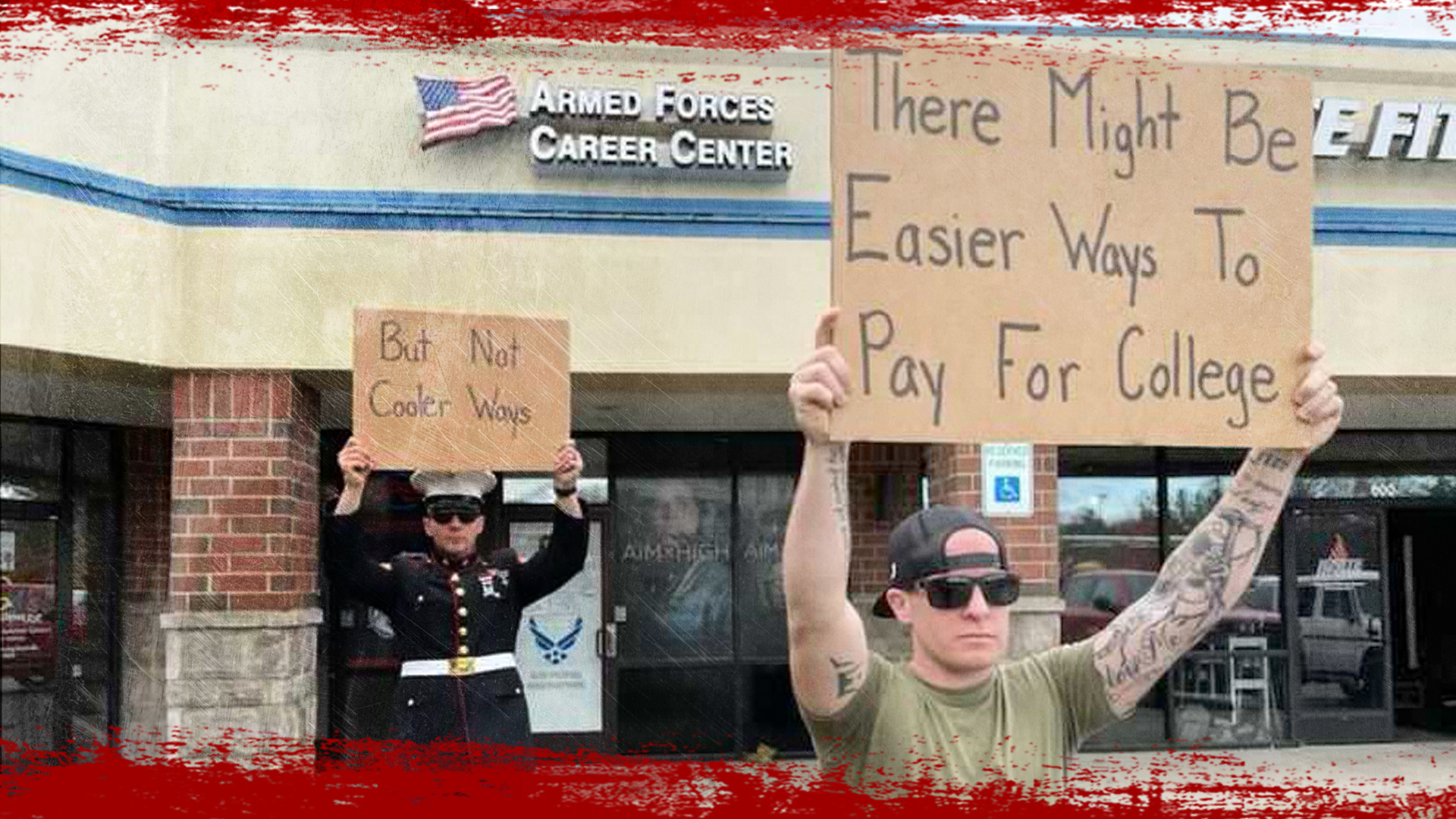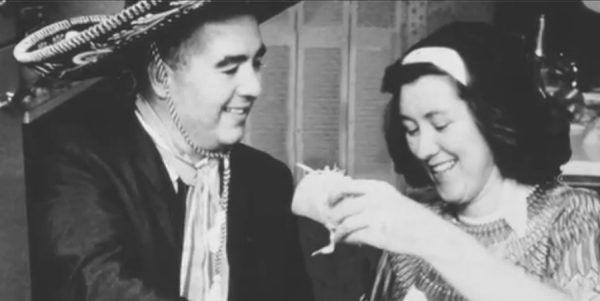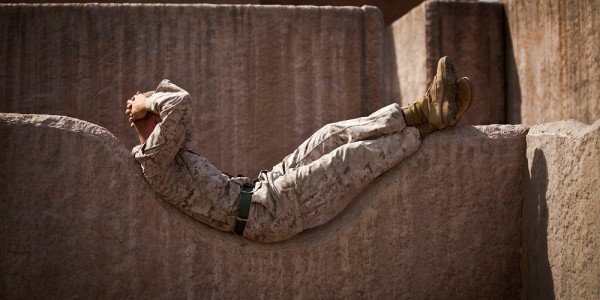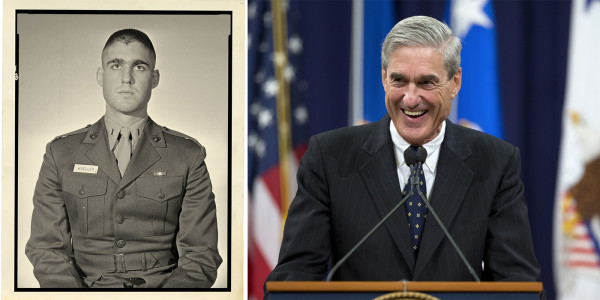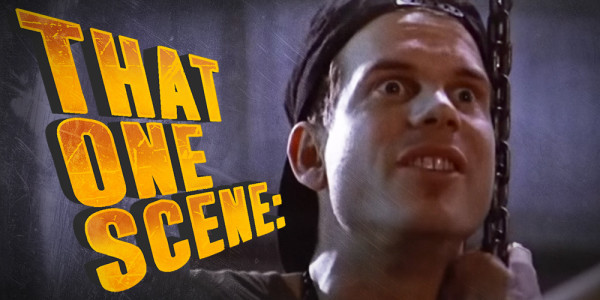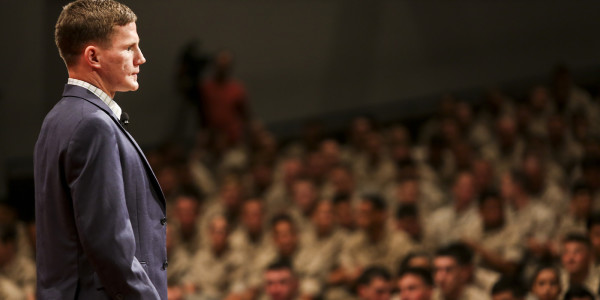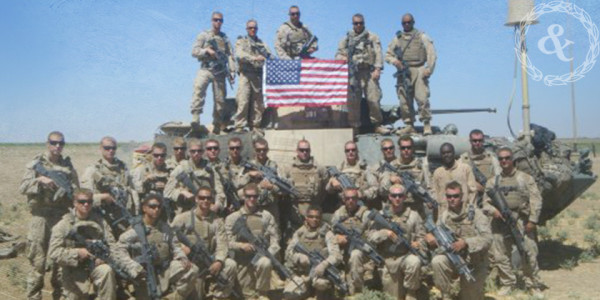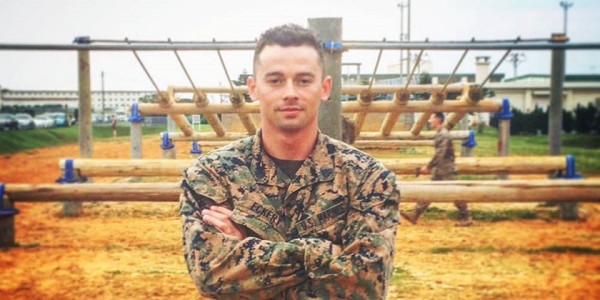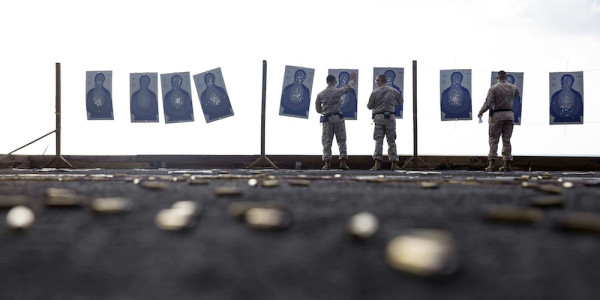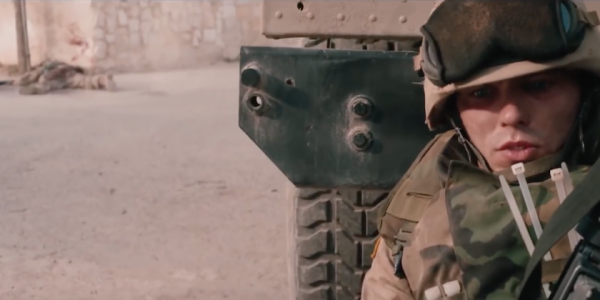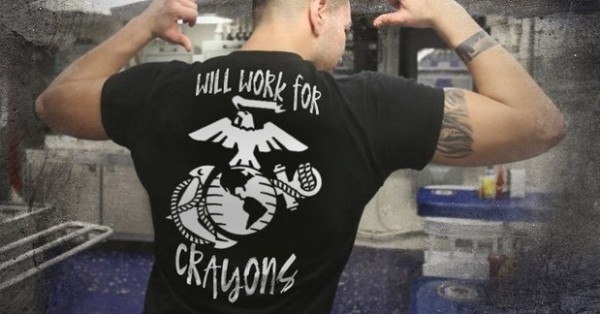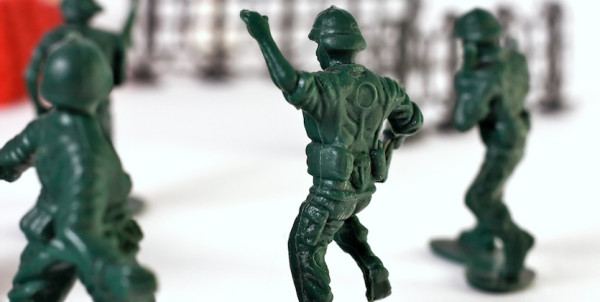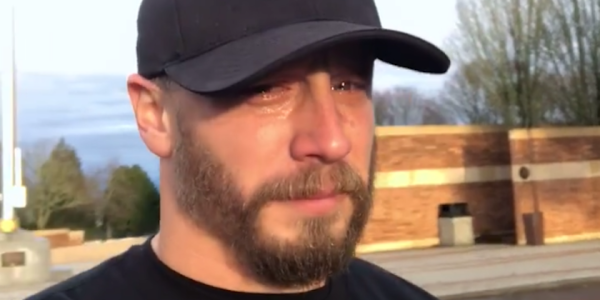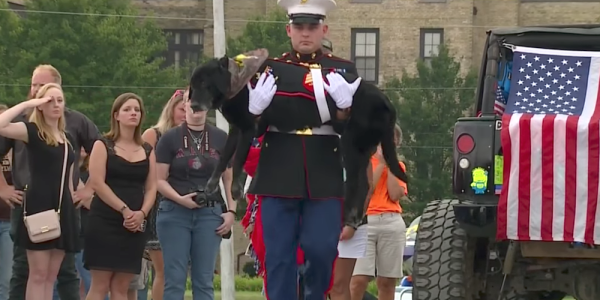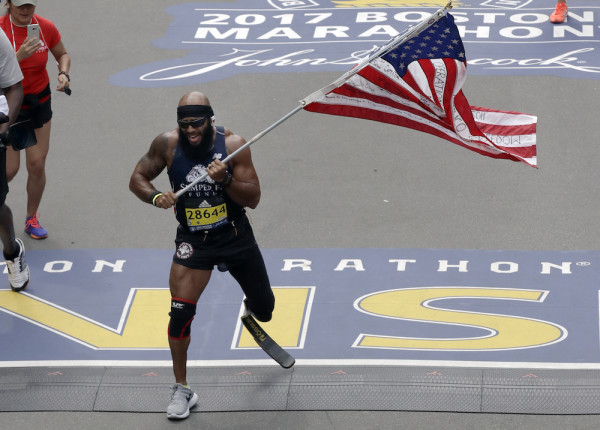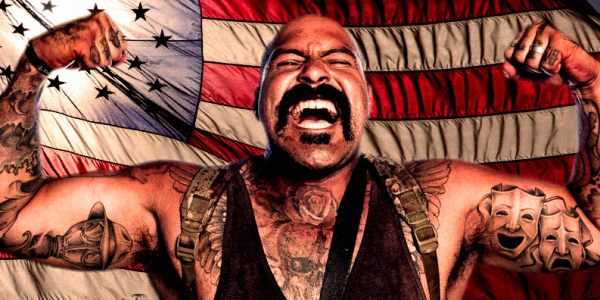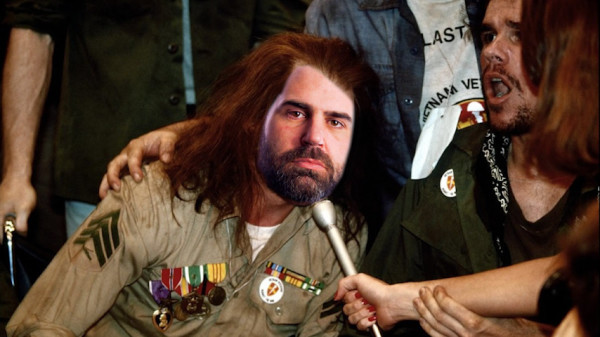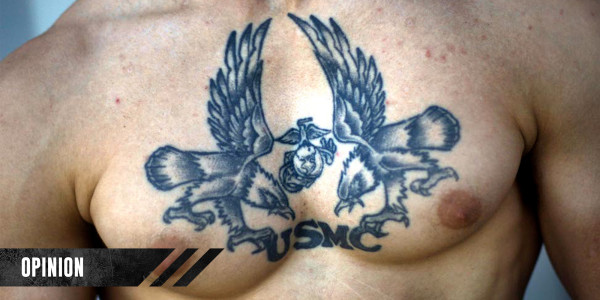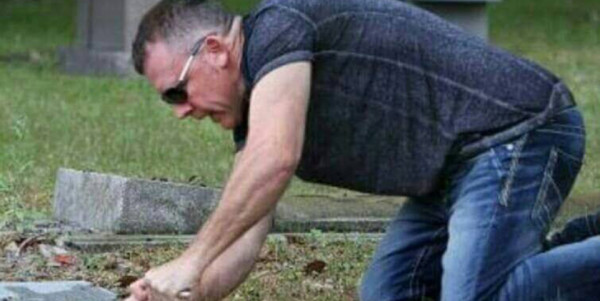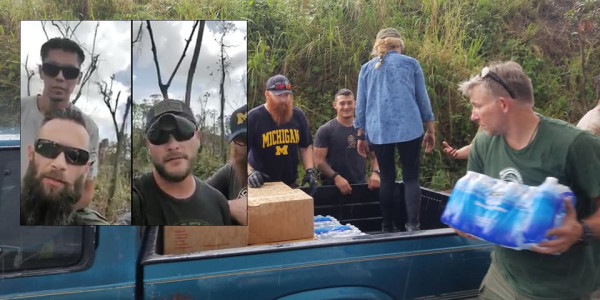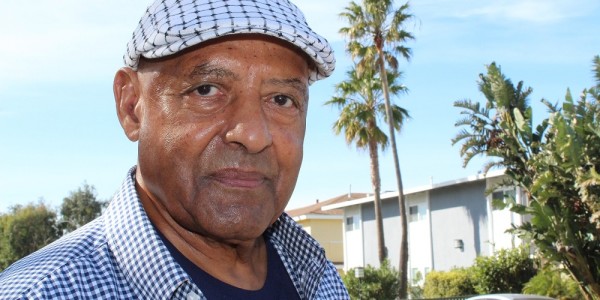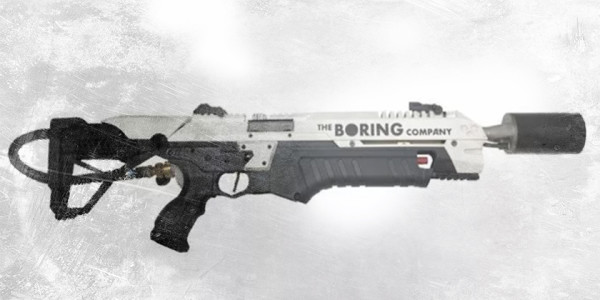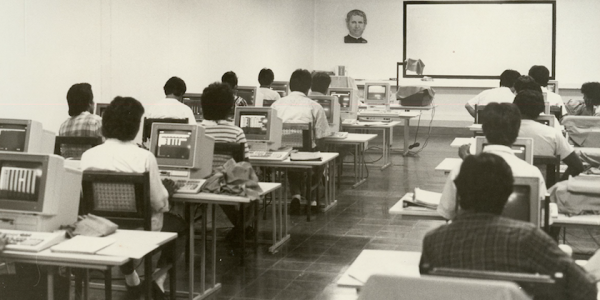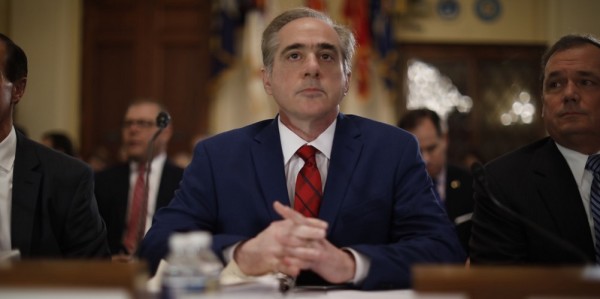Editor’s note: This article was originally published on Dec. 29, 2020.
Zachary Bell never planned on being a voice for the military and veterans community. Sure, there were issues he cared deeply about, but really, he just thought it’d be funny to stand on the side of the road with a piece of cardboard that read: “Take Motrin, drink water, change your socks.”
He definitely did not intend to start a trend (dare we say movement?) where current and former service members take photos of themselves while rocking a backward ballcap, shades, and a T-shirt, like some kind of professional veteran uniform of the day, as they hold up a sign with an in-the-know message for their peers. Each one is a concise and somewhat performative head nod to a shared experience: Post-9/11 military service.
The signs function like cheaply made cultural touchstones: Low fades win wars; Stop lying to your mom about your MOS; Reflective belts are not PPE. The messages are varied and delivered without judgment or malice. Some of them are, quite frankly, just statements of fact:
Bell is one of two former Marine infantrymen behind Veteran With a Sign, a new and rapidly growing Instagram page with a simple, and refreshing goal: to remind us what it was like to shoot the shit, back when we were in the military — and on a deeper level, how to communicate as we once did, when we knew that we were on the same team.
“It’s funny to use this common language and nomenclature — it’s like this secret Morse Code we all have — to try and bring people together,” Bell says. “What if I could use this thing that only military people have, and start there as a focal point on how to better communicate? And so I started to focus on this juxtaposition of a high technology tool — the internet and Instagram — and using, basically analog media, which are cardboard and a marker.”
Veteran With A Sign launched in mid-March with the Instagram handle Warfighter — the beloved buzzword of the military brass — and features messages, either from Bell or other veterans, scrawled out in marker, then photographed and plastered across the internet.
It’s tempting to say that the tone of Veteran With A Sign ranges from light to pointed or serious to silly, but neither of those descriptors is quite right. Rather, Veteran With A Sign stands somewhere in the middle, casually dispensing pearls of wisdom with little more than a sharpie and a piece of cardboard. “Perfect PT scores don’t make good leaders,” reads one sign, while another (accurately) notes that “Tattoos and long hair do not change my combat effectiveness.” They’re direct, and at times come off a little sarcastic, but in a way that suggests: This is common knowledge and only sounds edgy or pointed because only in the military do people need to be told this is true.
“There’s a lot of layers to it,” Bell says of the signs. “And it’s probably just because I want to feel smarter than I really am, full disclosure. But the idea is: What I want you to read is literally — and people overuse that word a lot — what’s on the sign. I don’t want you to take anything else from it.”
Video: Mattis: ‘If This Was Vodka, It Would Be A Lot Better Speech’
In the words of Jay Blancas, the other veteran with a sign and Bell’s right hand, their posts are an attempt at “using satire to get people to stop being so serious about their service and stop being so hard on themselves,” he says.
“If we can get people to poke fun at themselves, and laugh at themselves, that opens the door for conversations that we couldn’t have previously,” says Blancas, who served with Bell in Alpha Company, 1st Battalion, 6th Marine Regiment during their two tours to Afghanistan. “And that kind of sets up a comfortable environment where we can address things like mental health, that are a little bit more taboo in the military culture.”
Take this example:
The idea of the sign, Bell says, is to take a shared experience in the military — life after war — and get people to engage with it online in a way that’s different.
Imagine a group counseling session, if you would.
“What would be the most inconvenient thing to be different after war,” Bell asks rhetorically, before acting it out over the phone:
Veteran 1: “Oh, man, I was always gotta face the door.”
Veteran 2: “Hey brother, I can’t sleep at night.”
Veteran With A Sign: “Well, I can only go in wag bags now, you know?”
Veterans 1 and 2: “What? What do you mean?”
Veteran With A Sign: “I mean, I sleep well. I don’t ever get angry. But I cannot go to the bathroom unless it’s a wag bag. Crazy, right?
Veterans 1 and 2: “It’s cool, we’ll get through it together.”
With just a few words and a joke, the post invites readers to have a lighthearted conversation about mental health, free of the second-guessing, the gate-keeping, the awkwardness, and judgment that all-too-often follows those discussions online.
“I’m taking everyone to therapy and they don’t realize it,” Bell jokes. “The reality is that I’m trying to have a nuanced conversation about something that people just aren’t talking about. And so that’s built on the premise of how we’re all different after war.”
The signs are part of a larger gambit. The goal, Bell says, is to “create a community that doesn’t take itself too seriously, with the best of intentions and radical candor.”
And that “radical candor” Bell is talking about is a mainstay of active duty military life. The tone is reminiscent of how a team or squad leader might address their boots in the Marine Corps.
“Once I became a team leader and a squad leader, I was basically just riffing, doing like 10 minutes on stage,” Bell says, before launching into a demonstration over the phone: “If you still know what the warrior breakfast tastes like,” or “you’re still not sure how to put money in your Thrift Savings Plans,” then get up and “go police call,” he recounted.
Given Bell and Blancas’ roots, it’s no surprise that the page leans heavily on Marine Corps culture, especially infantry culture.
“If I could take this same thing that we used to do — which is really just shooting the breeze and talking shit — to a point where I can tap into a level of nostalgia and have people really remember the things that they liked about military service, I think something really good might come of it,” Bell says.
Bell enlisted in the Marine Corps as an infantryman in 2007, and after hitting the fleet and landing with Alpha Co., 1/6, at Camp Lejeune, North Carolina, he was immediately informed by the senior guys in his squad that he’d missed the war: Iraq’s over, you’re going to be a boot until you get out.
It’s a refrain heard by many who joined in the late 2000s, though it didn’t hold true. Within a year Bell and Blancas were in Afghanistan’s Helmand province, first to Garmsir in 2008 and then again in 2010, this time to Marjah, during the largest military operation in the country since the U.S. invasion.
Helmand province at that time was a place where the smallest misstep spelled disaster — but you never really knew which step might get you, or a friend, killed: It could come at any time, and from anywhere; a single well-placed round, a sporadic burst of AK fire, an incoming rocket-propelled grenade, or an improvised explosive device that detonated as U.S. Marines advanced on their attackers, crossed a goat path, or drove down a dirt road.
Marjah in particular “was the wild west,” Bell says. “You were just trying to survive.”
As part of then-President Barrack Obama’s decision to refocus U.S. military efforts on Afghanistan, both Bell and Blancas were part of a troop surge that would swell America’s troop presence in that country from 30,000 in 2009 to more than 100,000 at its peak in 2011.
With the influx of additional troops came new battlefields. Marjah, at the time a Taliban stronghold, was one of them. It was meant to be a kind of field-test of counter-insurgency operations, or COIN, in Afghanistan, and it was hoped that the new strategy would help cut a path toward the war’s end.

The mission was two-fold: The Taliban, who operated openly and with support, had to be defeated, and then, with that done, the local residents had to be won over. On Feb. 13, 2010, in the dead of night, Bell and Blancas were two among hundreds of U.S. Marines who inserted into the city by helicopter. Once there, they spent the next several days squaring off against entrenched Taliban fighters who’d had time to prepare. The city was heavily mined with IEDs, and its defenders were well armed and equipped.
And that was just the first week. By the time the last helicopter had dropped off the last man and taken off into the night, they were barely two months into their seven-month tour. Despite the Battle of Marjah being won, the fighting never really stopped. Instead, the initiative was seized by the Taliban, who freely engaged U.S. troops, rocketed their positions, and detonated IEDs on convoys and patrols — undermining security efforts in the city.
“I always felt like we were on the back foot,” Bell says of Marjah. “It felt like no matter how good or bad you were, you might not make it.”
The experience was formative for Bell, who since getting out of the Marines in 2011 has shared the insight that came from those deployments in a number of stories and reflective essays. They range from his struggle to explain his experiences in combat to his two daughters, to how the simplest things like the changing of seasons have taken on new meaning after enduring the spring “fighting season” in Helmand province.
If you’d never read his other work and have only Veteran With A Sign to go off of, you might be forgiven for missing the depth resting beneath the surface of so many of their posts.
“Some of it is just stuff I’ve kind of always said, but I’m doing it out loud,” says Bell.
And there’s clearly a willing and engaged audience. Since the page’s launch earlier this year it’s accrued more than 60,000 followers on Instagram and has begun to build up a solid base of dedicated fans.
The page’s success has even been used as fodder for further jokes.
While it may come across glib, or maybe even haughty at first read, for those who’ve spent any time on social media in veteran-centric circles, the words carry a great deal of truth: Online, we sometimes eat our own.
It doesn’t take much digging to find evidence of tribalism in the military and veterans community, whether it’s grunts versus POGs, combat vets versus fobbits, lifers versus the one-and-done enlistees, operators versus everyone who’s not SOF, and Navy SEALs versus anyone with a better book deal. If you have only the military-centric internet to go on, it can sometimes feel as if, after two decades of war, and an untold number of books, memoirs, films, and TED Talks with post-9/11 military veterans, there are only so many pieces of “the veteran pie” left, as Bell puts it.
“It’s just not reality,” Bell says. “Everything’s different. Right? Everyone has their own journey.”
As for Veteran With A Sign’s journey, when the page kicked off back in March, it was a bit of a rocky start.
To be blunt, people just didn’t get it.
“And when I say didn’t get it, I’m being kind,” Bell says. “They literally could not understand it. They’re like ‘why is he holding up a sign?’”
Or the criticism would turn to specific posts, particularly those that threw shade or poked fun at some part or group within the military and veterans community. On the rare occasions Veteran With A Sign does toss out the odd jab, it tends to punch up, either at the top brass, and those in a higher (or more cushy) position than the rank and file, or at those who already receive a fair bit of acclaim and adoration, like Special Operations Forces.
“It’s because of this idea that everything’s above reproach,” Bell says.
“I mean, people were getting legitimately mad at us, you know,” Blancas said, referring to one post in particular about Navy SEALs. “The amount of hatred in those comments was insane.”
But recently, they’ve noticed a change in responses.
“Well, we just took another crack at the SEALs this week,” Blancas said. “And this one, now everybody gets it. Everybody’s in on the joke.”
“It’s cool to see that little paradigm shift,” Blancas added. “It went from being this inside joke between me and Zach to being like, now we’ve got [60,000] people in on it.”

But not every post is light, or tongue-in-cheek, and quite a few have used the page’s growing popularity to bring in influential veterans from other spaces and platforms, to help draw attention to ongoing problems facing the military and veterans community, often with an insider’s eye.
One such message from The Marine Rapper, reads: “Push-ups ain’t gon stop they death.”
The sign is a reference to the near-constant flood of viral campaigns, like the “22 push up” challenge to raise awareness about the suicide epidemic facing the veteran community. It’s an issue that most folks who’ve served are already all too aware of.
“I want you to call someone, and talk to them for 22 minutes, instead of doing 22 push-ups, and maybe that’ll be enough to stop them from doing something that they can’t come back from,” Bell says.
Other posts come from followers of the page who have submitted ideas, or photos of themselves, decked out in Veteran With A Sign attire, and holding messages of their own.
It’s the sort of input that Bell says he welcomes.
“I’m a Marine Corps grunt. Everything from my military experience is viewed through that lens,” Bell says. “I shouldn’t be the one mansplaining different aspects of military service to other people.”
“It’s not as nuanced or as accurate or impactful as you know, someone who is in the Air Force talking about their times or whatever it is, right? And in those are the different layers I’m trying to build to make a larger community beyond just that.”
And the price of entry to this community is quite low: All you need is a T-shirt, a ball cap, shades and something worth saying.
But don’t forget to check your ego at the door, Bell says.
“I’m trying to systematically dismantle this idea that military service makes you better than anyone else.”

